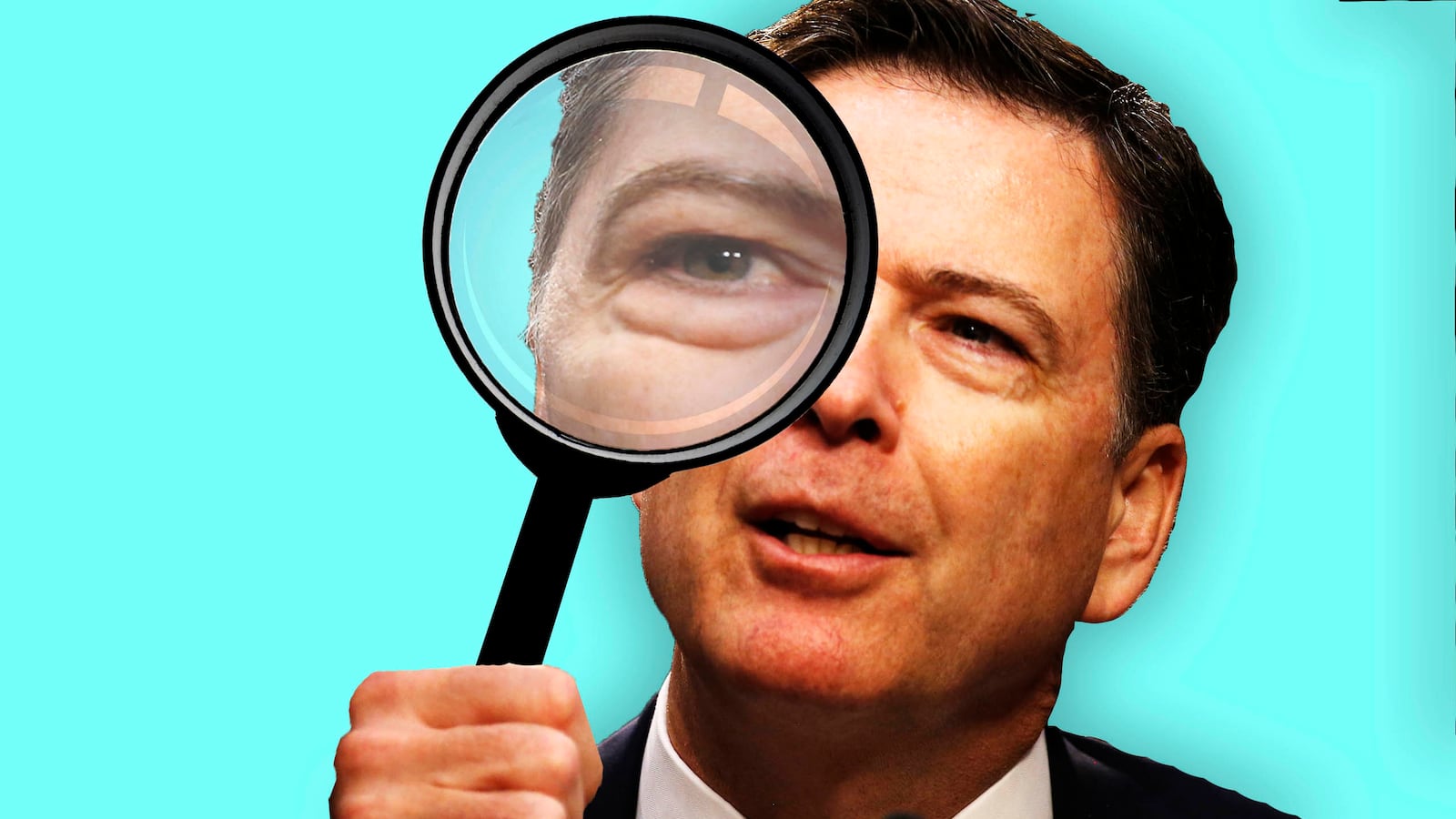It wasn’t just what ex-FBI director James Comey told senators about the lead-up to Donald Trump firing him over his Russia investigation. It was what he intimated, suggested, winked, and implied about possible ties between Team Trump and the Kremlin.
Throughout the three-hour hearing, Comey dropped several breadcrumbs for legislators, FBI investigators, reporters, concerned citizens, and Tweetstormers to follow. Here are five of these enticing potential clues.

American Hackers?
So far, there are few public indications that there were any Americans involved in hacking the 2016 campaign. The Democratic Party networks were infiltrated by the Russian-intelligence-aligned hacking units known as Fancy Bear and Cozy Bear. The disseminators of the exfiltrated data are entities either known to be or suspected of being foreign: DCLeaks, Guccifer2.0 and WikiLeaks. But Comey suggested – perhaps idly, certainly publicly – that there might indeed have been a domestic tie.
As the nearly three-hour hearing drew to a close, Comey mused about the “vital” importance of special counsel Robert Mueller’s inquiry, owing to the persistent threat from Russian electoral interference. “I know I should have said this earlier, it’s obvious, but if any Americans were part of helping the Russians do that to us, that is a very big deal,” Comey said. “And I’m confident that if that is the case, Director Mueller will find that evidence.”
Establishing a tie not only to Russia but to the hacking units themselves would likely lead to an active criminal case. Nearly two years after the Russians began conducting digital reconnaissance on the Democratic National Committee networks, no American has been accused of aiding them, let alone indicted, let alone convicted.
Thus far, the closest known tie between any American and Russian hacking teams is a series of August 2016 Twitter direct messages between Guccifer2.0 and geriatric dandy and dirty tricksman Roger Stone, a Trump ally, who boasted of knowing about John Podesta’s hacked emails before they were public. Stone also said last summer he was in touch with WikiLeaks’ Julian Assange, ahead of a WikiLeaks Podesta email dump that Stone months earlier mused would be an “October surprise.” WikiLeaks denies any such contact took place. As well, the Wall Street Journal recently reported that Guccifer2.0 was also in contact with a Florida Republican operative, Aaron Nevis, who also posted pilfered DNC documents to his pseudonymous blog.
Trump himself, in July 2016, publicly called for the Russians to hack Hillary Clinton’s private email server to recover 30,000 supposedly deleted emails.

Dodgy Dossier
The infamous “Golden Showers” dossier, compiled by former British spy Christopher Steele, has been widely lambasted as a work of hearsay and fiction. But Comey on Thursday implied there might be something to at least some of the dossier’s claims, even as he called some of the material “salacious and unverified.”
“If you've got a 36-page document of specific claims... the FBI would have to, for counterintelligence reasons, try to verify anything that might be claimed in there… Probably first and foremost is the counterintelligence concerns that we have about blackmail. Would that be an accurate statement?” asked Sen. Richard Burr, the committee’s Republican chairman.
“Yes. If the FBI receives a credible allegation that there is some effort to co-opt, coerce, direct, employ covertly an American on behalf of the foreign power,” Comey answered.
“And when you read the dossier, what was your reaction?” Burr countered.
“Not a question I can answer in open setting, Mr. Chairman,” Comey replied.
The dossier’s most outlandish accusations involved Trump being recorded in lewd acts with Russian sex workers. In his written and oral testimony, Comey said this was a subject Trump brought up more than once. Months after Comey had told Trump about the dossier’s allegations, the president again brought them up. Trump “said he had nothing to do with Russia, had not been involved with hookers in Russia, and had always assumed he was being recorded when in Russia,” Comey wrote.

Shifty Jeff Sessions?
Attorney General Jeff Sessions recused himself from Russia-related inquiry matters on March 2. Sessions did so reluctantly, after it was revealed that he had met with Russian ambassador Sergey Kislyak. But Comey suggested there was something more at work.
Sessions’ recusal was “inevitabl[e],” he told Senator Ron Wyden. But then Comey said he and the FBI were “also” aware of “facts that I can't discuss in an opening setting that would make his continued engagement in a Russia-related investigation problematic.”
The fact that Sessions met Kislyak several times is public — Sessions held a press conference about them. If they were the sum total of his “problematic” ties to Russia, Comey would have no need to go into closed session to discuss them.
Additionally, Senator Kamala Harris, a freshman Democrat and former California attorney general, leaned hard into suggestions that Sessions has not fully recused himself from the probe. Comey said his former boss was that he had consulted with “career ethics officials that know how to run a recusal,” but didn’t know how specifically Sessions is fencing himself off from the inquiry.

Mike Check
Vice President Mike Pence has been portrayed as the main victim of Michael Flynn’s perfidy for lying to him about his call with Kislyak about sanctions. However, Comey said it’s his “understanding” that Pence was aware of the concerns surrounding Flynn prior to or during his tenure as national security adviser. Those concerns included Flynn’s non-disclosure of his lobbying on behalf of Turkey and his payment for a speech to Kremlin-owned network RT. Rep. Elijah Cummings sent a letter to the Trump transition team on Nov. 18 — the day Flynn was announced as national security adviser — informing them of Flynn’s foreign problems. Pence was the head of the transition team, but despite that has claimed he was unaware Flynn was a non-registered foreign agent until Flynn registered with the Justice Department in May.
And it’s not just Pence. Questions also surround what and when CIA Director Mike Pompeo knew about Flynn – whom Comey confirmed on Thursday has been under active criminal investigation.
That investigation stemmed from Flynn lying to FBI agents about his conversations with Kislyak, something that then-acting attorney general Sally Yates first warned the White House about on January 26. Yates’ concern, she would later testify, is that the national security adviser was vulnerable to Russian blackmail, the most serious counterintelligence concern a senior U.S. official can face. Yates testified that her concerns were discussed within the U.S. intelligence community. One of the officials who might be expected to have been looped in on that is CIA director Pompeo.
On May 11, during Senate testimony, Pompeo told Wyden he had no “first-hand” knowledge of Yates’ concerns – nor even any “second-hand or third-hand knowledge of that conversation either.”
But Comey suggested otherwise on Thursday when Wyden asked if Yates’ fears about Flynn would have been discussed with “anyone at the CIA or Dan Coats’ office, the DNI?”
Comey was far from definitive, but nevertheless answered: “I would assume, yes.”

The Bank of Spies
During the hearing, Sen. Angus King asked a seemingly innocuous question: “What do you know about the Russian bank VEB?”
Comey quickly answered, “Nothing that I can talk about in an open [unclassified] setting.”
But there is quite a bit known about the Russian state-owned development bank known as VEB, short for Vnesheconobank. The bank, headed by a former intelligence officer Sergei Gorkov, is so close to the Kremlin that the U.S. government sanctioned it after Russia took over Crimea in 2014. (“This is not a bank,” one analyst told the New York Times. “We should rather treat this bank as a government agency.)
One of the executives still listed on its website, Evgeny Buryakov, is a convicted spy who recently completed his sentence in federal prison and was promptly kicked out of the country. Buryakov’s counterparts in Russia’s foreign intelligence service, or SVR, tried to recruit Carter Page before he became a foreign policy adviser to the Trump campaign.
Most importantly, Jared Kushner, Trump’s son-in-law and top aide, privately met with Gorkov after Trump’s election.
What exactly they discussed is a matter of dispute, but Comey hinted Thursday that whatever investigators uncovered about that conversation—and about the bank—would be extremely sensitive.
— Additional reporting by Justin Miller







